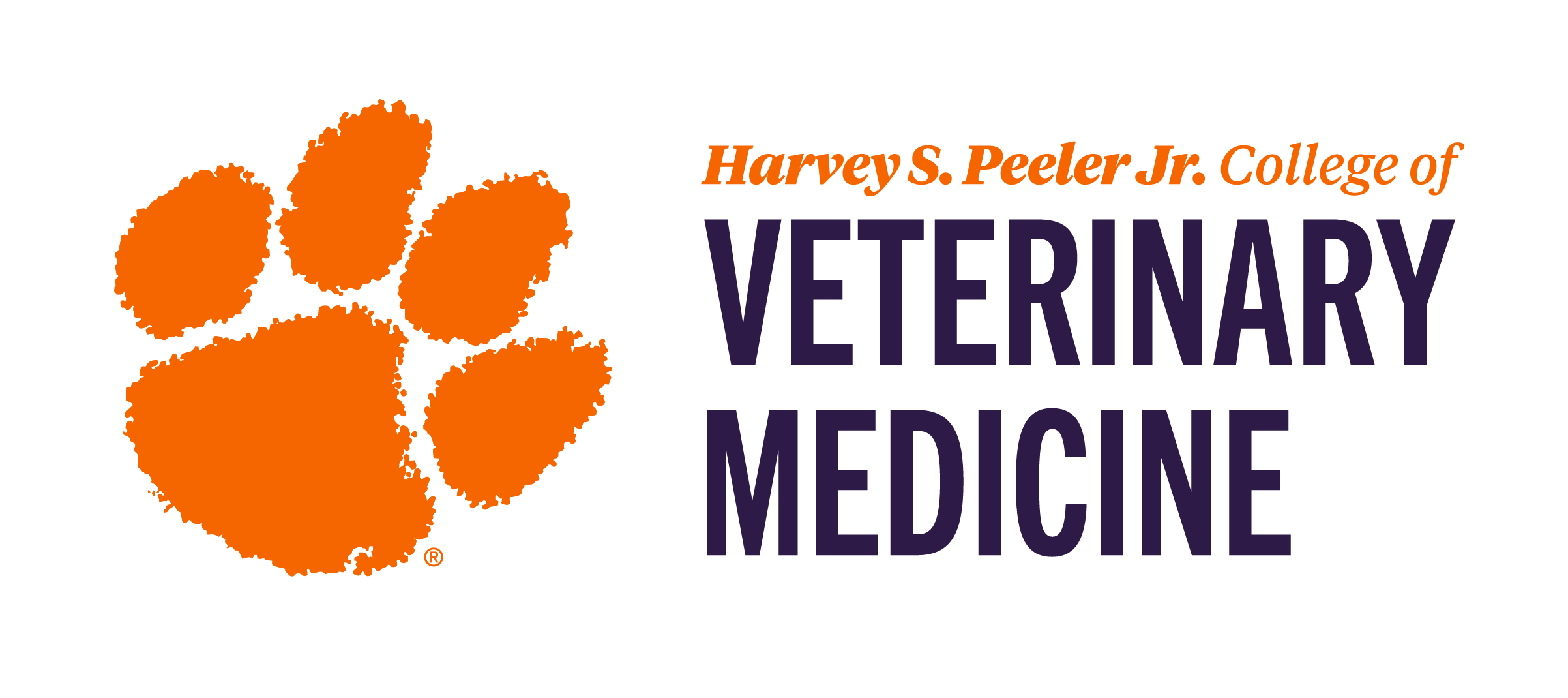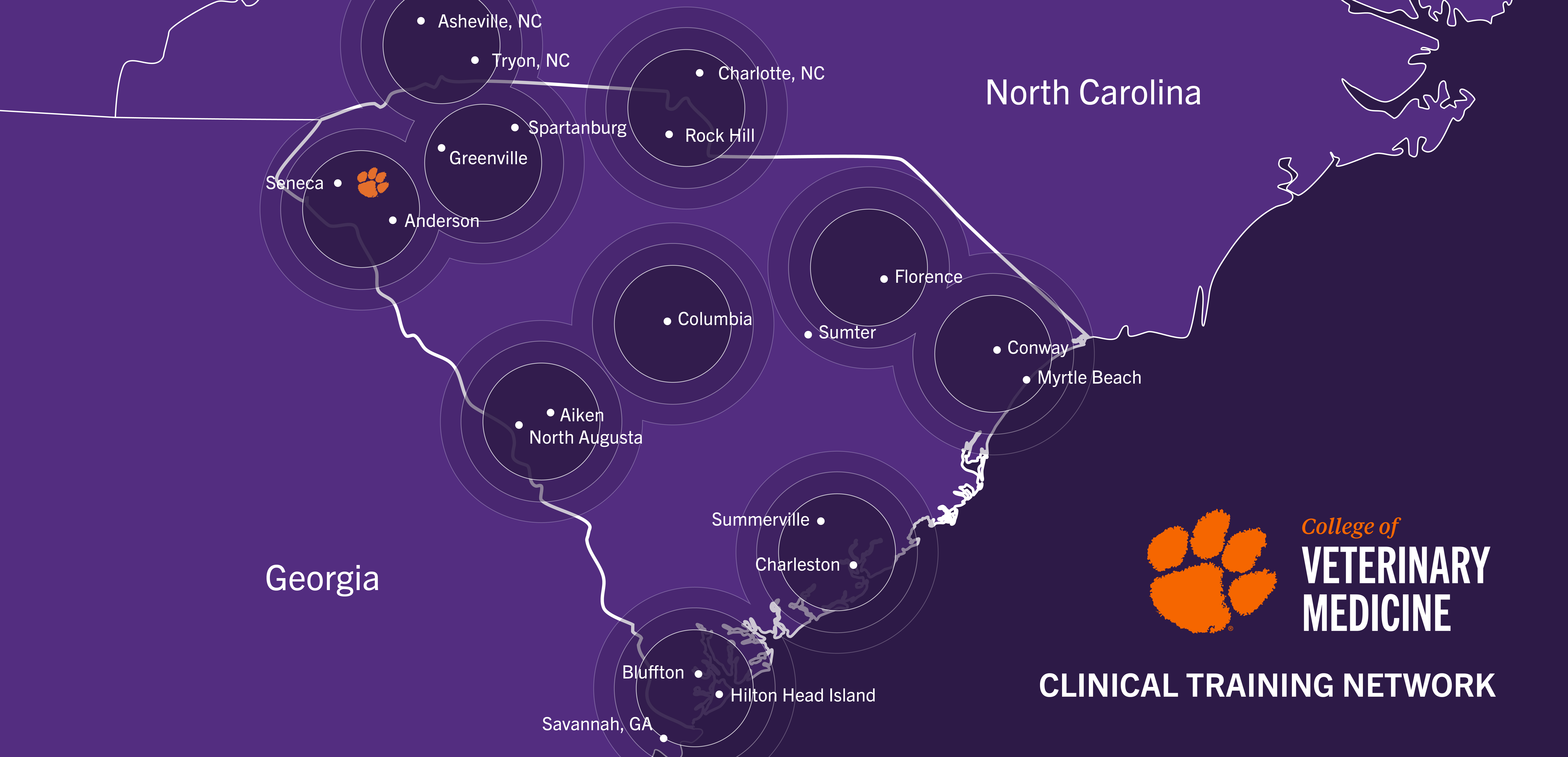
Clinical Partners
Make History with Us
Training the Next Generation of Veterinarians
The goal of the Clerkship Program during Year Four of students' Doctor of Veterinary Medicine (DVM) journey is to provide workplace-based training and build professional relationships for students as they approach the completion of the program. In their fourth year, students will be prepared to serve as valuable members of your clinical team. This clinical teaching model will provide Clemson graduates with a hands-on understanding of the veterinary industry in the state of South Carolina and beyond.
Our clinical partners will play a vital role in preparing the next generation of veterinarians. Your willingness to share your knowledge and expertise will enrich the clinical experiences of Clemson DVM students and prepare them for a successful career. We deeply appreciate your contributions and dedication to the Harvey S. Peeler Jr. College of Veterinary Medicine.

The clinical training network is organized into regional “communities” to provide a range of opportunities and minimize relocations for year four students. Partners outside of these hubs can still apply to participate. Future "communities" may develop as the program grows.

Brian Butler, DVM, MPH, PhD, DACVP
Associate Dean of Clinical Programs
Dedicated to the support and professional development of all veterinary students, Brian believes the veterinary educational experience is an opportunity to expose students to the wide range of career opportunities available within this exciting profession. Butler is honored to be a part of the Harvey S. Peeler Jr. College of Veterinary Medicine and is committed to bridging the gap between medical theory and practical clinical training for all Clemson students.
Frequently Asked Questions
-
How do I get started?
Clinical Partners will be requested to support Clemson Harvey S. Peeler Jr. College of Veterinary Medicine accreditation efforts by completing the following tasks:
- Provide a letter of interest. (See the following drop-down for a template.)
- Complete a brief online survey about your practice.
-
Letter of Interest Template
A Letter of Interest must be provided to support the Clemson Harvey S. Peeler Jr. College of Veterinary Medicine accreditation process. This letter aims to portray support and open communication with CVM clinical partners for student workplace clinical education (clerkships). Please refer to the sample below to help with the composition, adjusting as you see fit.
Dean Marks,
- (insert practice name) is pleased to support the Clemson University Harvey S. Peeler Jr. College of Veterinary Medicine by providing on-site training and evaluation for future DVM students during the Year 4 Clerkship rotations.
- We understand that our DVMs will receive regular training to serve as a preceptor for DVM students.
- We agree to provide documentation about my practice that the Harvey S. Peeler Jr. College of Veterinary Medicine will need for accreditation purposes.
- We also agree to on-site visits by the AVMA Council on Education as necessary to meet your accreditation requirements.
Signed by the practice owner, CEO and/or medical director.
Once complete, email your letter as a PDF attachment to Dr. Brian Butler.
-
What expectations are there while hosting students?
Preceptor Training
The Harvey S. Peeler Jr. College of Veterinary Medicine will provide the required training for all DVMs and staff at Clinical Partner sites regarding hosting students in the workplace. Including topics such as:
- Providing students with adequate workplace orientation.
- Providing students with consistent feedback and assessment for all learning outcomes.
- Documenting and responding to any concerns regarding student performance and/or professionalism issues.
- Following Harvey S. Peeler Jr. College of Veterinary Medicine guidelines for Community, Engagement, Belonging, and Access (CEBA).
Evaluation of Students
- Preceptors will provide a score (1-5) to assess students on the Entrustable Professional Activities (EPAs).
- Scoring will be a streamlined process that can occur on laptop computers and/or mobile devices.
- Preceptors will receive communications from the Harvey S. Peeler Jr. College of Veterinary Medicine Faculty Mentors about student progress throughout the year four clinical training.
- In addition, preceptors will provide one Final Evaluation for each student at the end of each clerkship rotation.
Number of Students
- Each Clinical Partner practice will decide if hosting more than one student is appropriate for your practice.
- The Harvey S. Peeler Jr. College of Veterinary Medicine will expect Clinical Partners to host students for at least six months per year, though eight to ten months would be preferred.
-
What are the benefits of being a Clinical Partner?
- Instruct future veterinarians by hosting and mentoring fourth-year veterinary students during clinical clerkship experiences.
- Make a positive impact on the veterinary profession and education in South Carolina.
- Evaluate potential future employees in your facility during clerkship rotations.
- Become exposed to recent veterinary advancements by working with Clemson DVM students.
- Gain opportunities to serve on vital college objectives including Admissions Committee and Curriculum Committee.
- Have access to Clemson University Library resources including leading veterinary journals and textbooks.
- Have access to various training opportunities and continuing education including RACE-approved workshops and virtual modules provided by the college.
- Be invited to attend on-campus events including the Annual Appreciation Dinner.
-
What are the expectations for the abilities of year 4 DVM students?
- Students' abilities and skills will vary based on their individual experiences and progress.
- Before starting the fourth year Clerkship Program, as part of the DVM curriculum, all DVM students will have the following proficiencies:
- Attained competency in all tasks expected of a fourth year veterinary student.
- Completed multiple client communication trainings.
- Gained proficiency in history gathering and physical exams in common domestic species.
- Practiced advanced exam skills (i.e., lameness exams, neuro exams, etc.).
- Performed basic diagnostic testing/imaging and interpretations.
- Created and executed at least one small animal anesthetic protocol.
- Performed one spay, neuter and dental as the lead surgeon.
- Managed cases of both large animals in the college Ambulatory Service and small animals in the college Community Veterinary Clinic.
- As students make progress through the 44-week Clerkship Program, their case management skills will improve with each clerkship experience. A student is expected to grow from novice to proficient over their final year.
-
What resources will students need at my practice during rotations?
- Mentorship and guidance for clinical case management and skills development.
- Access to the internet.
- Supervised access to the electronic medical records (EMR) system used in your practice.
- A small amount of space for personal belongings.
- A small workspace to complete readings, assignments, and medical records.
- Adequate parking near your facility.
- Arrangements will be made in advance for any student that may need additional accommodation(s).
-
What are the considerations regarding professional liability and health insurance?
- Clemson University will maintain $1,000,000 in professional liability insurance through the American Veterinary Medical Association Professional Liability and Trust (AVMA PLIT) for all DVM students.
- Clemson University will maintain $1,000,000 in additional tort liability insurance per incident.
- Clemson University requires all DVM students to maintain and provide proof of health insurance for the duration of the program.
- In addition, each Clinical Partner practice should provide a certificate of insurance verifying that it maintains commercial general liability insurance.
- The Affiliated Veterinary Practice Clerkship Agreement signed by all Clinical Partners in 2028 will itemize all the contractual assurances listed.
Please note that all admitted students will be required to undergo a criminal background check and follow the CDC guidelines for vaccination to prevent rabies.
